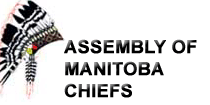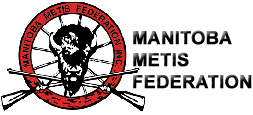|
April 17, 2000
MANITOBA GOVERNMENT RECEIVES ABORIGINAL JUSTICE REPORT
Province Says Yes To AJIC Recommendations
The Manitoba government has received the first
quarterly report of the Aboriginal Justice Implementation Commission
(AJIC) and has started acting on its four recommendations, which
include renouncing the province's half-interest in minerals on reserves
and entering into agreements for child and family services that
are developed and operated by Aboriginal communities.
The AJIC, led by commissioners Paul Chartrand and
Wendy Whitecloud, was established last fall to review the report
of the Aboriginal Justice Inquiry, identify priority areas for government
action, and make practical, cost-effective and attainable recommendations
for improving justice programs and services for First Nations and
Metis people in Manitoba.
"I would like to thank the commissioners,
elder advisors and members of the Aboriginal community for their
hard work," said Attorney General Gord Mackintosh. "While
we cannot erase the frustration and disappointment caused by many
years of inaction, we have begun implementing the report's recommendations
-- signal of our commitment to the well-being of Aboriginal Manitobans
and their families."
The commission, which is to deliver quarterly reports
to the province, concluding in spring 2001, made four recommendations.
They include:
- entering into agreements with the Assembly of Manitoba Chiefs
and the Manitoba Metis Federation (MMF) to develop a plan that
would result in First Nations and Metis communities developing
and delivering Aboriginal child welfare services;
- amending the Interpretation Act of Manitoba to provide that
all legislation be interpreted subject to Aboriginal and treaty
rights;
- renouncing the provincial government's 50 per cent interest
in minerals on Indian reserves; and
- initiating discussions with the MMF to address matters within
the jurisdiction of Manitoba that have been the subject of recommendations
by the Aboriginal Justice Inquiry (AJI) and Royal Commission on
Aboriginal Peoples (RCAP).
Eric Robinson, Minister of Aboriginal and Northern
Affairs, said the four recommendations have been accepted and are
in various stages of implementation. The province will introduce
amendments to the Interpretation Act during the upcoming session
of the legislature, and a meeting has been set up with the MMF next
week. The province will also relinquish its half claim on minerals
found on reserves."These are historic, essential first steps
towards the implementation of the Aboriginal Justice Inquiry report,"
Robinson said. "Meaningful changes in our systems are needed
if we are to restore trust and rebuild hope among Aboriginal people
living in Manitoba. Our aim is to put in place comprehensive strategies
that deal with long-term inequities and injustices."
Tim Sale, Minister of Family Services and Housing,
said Manitoba has already taken significant steps with respect to
child welfare issues. Two months ago, the province signed a historic
Memorandum of Understanding with the MMF which will lead to the
creation of a child and family services system for Metis throughout
Manitoba. Similar negotiations with First Nations are underway.
"These agreements acknowledge that First Nations
and Metis families have a right to develop and control the delivery
of key child and family services," Sale said. "I am honoured
to be part of a process which assists in building a society in which
Aboriginal children and their families can live, learn, work and
play within their own cultural traditions and beliefs."
In addition to its four recommendations, the AJIC
was critical of the previous administration's record on AJI, concluding
"there has not been a consistent overall plan to implement
the recommendations of the inquiry. While there have been initiatives,
pilot projects and progress in some areas, overall, by and large,
the recommendations have not been implemented."
The AJIC also identified 10 priority areas for
government, including child welfare, equity across government, police,
community justice, early support and crime prevention measures for
youth, family violence, Aboriginal rights, northern flood agreements,
treaty land entitlements and Metis issues. Mackintosh said the government
accepts these as "priority areas for action."
"These priority areas match a number of initiatives
already announced by the province, specifically Neighbourhoods Alive!
and Healthy Child," the Minister added. "Through these
strategies, we will be focusing on programs such as parent-child
centres, prenatal and early childhood nutrition, as well as housing,
employment, recreation and safety initiatives that aid in building
safe, stable and healthy communities."
The Aboriginal Justice Inquiry was established
in April 1988 to investigate the condition of Aboriginal people
in the justice system. The scope of the AJI included all aspects
of the system-policing, courts and correctional services. The findings
and recommendations of the AJI were released in the wide-ranging
report of 1991.
One of the main recommendations of the AJI was
to set up a commission to oversee implementation. Assisting AJIC
commissioners' Chartrand and Whitecloud are elder advisors Eva McKay
and Doris Young, and Ron Perozzo, a Justice Department coordinator
who serves as a link between the AJIC and the programs of government.
Copies of the first quarterly report of the
AJIC are available at the AJIC office, 440-500 Portage Ave.,
and on the commission's Web site at www.ajic.mb.ca
- 30 -
News
Releases
|









